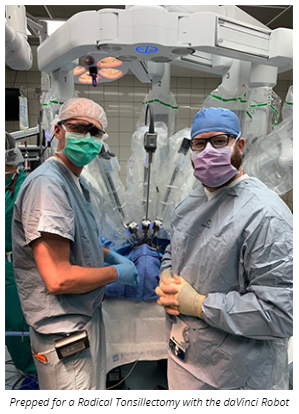Chronic Sinus Solutions from a Sinus ENT
Wiki Article
Checking out the Area of Otolaryngology: What to Expect When You Consult an ENT
Otolaryngology, commonly referred to as ENT, incorporates the medical diagnosis and therapy of ear, nose, and throat disorders. ENT surgery. For those experiencing related concerns, speaking with an ENT specialist can supply quality and alleviation. Understanding what to anticipate during such consultations is vital for reliable communication and treatment. This review will certainly detail vital elements of the ENT experience, including common reasons for check outs and the processes included in diagnosis and therapyRecognizing Otolaryngology: A Summary
Otolaryngology, often referred to as ENT (Ear, throat, and nose) medication, is a specialized branch of medicine that concentrates on the diagnosis and therapy of conditions affecting these critical areas of the body. This area includes a large range of problems, including those associated to hearing, equilibrium, respiratory system feature, and speech. Otolaryngologists are trained to handle both medical and clinical therapies, utilizing sophisticated techniques and innovations. Their know-how extends past traditional disorders, attending to problems such as allergies, sinus infections, and hearing loss. In addition, they play an important function in the monitoring of head and neck cancers cells, supplying extensive care tailored to individual person requirements. In general, otolaryngology stays vital for keeping health and wellness and high quality of life in affected people.Usual Reasons to See an ENT Professional
Many individuals seek the proficiency of an ENT professional for a variety of factors, reflecting the varied nature of problems that impact the nose, throat, and ear. Typical concerns include persistent sinusitis, which usually brings about relentless nasal blockage and face pain. Allergies and their connected signs and symptoms, such as sneezing and itching, also prompt brows through to these experts. Hearing loss, whether abrupt or steady, is an additional substantial reason for consultation. In enhancement, people may seek examination for throat disorders, consisting of consistent hoarseness or swallowing troubles. Sleep apnea, identified by disturbed breathing throughout rest, is often resolved by ENT experts also. Each of these conditions highlights the importance of specialized care in handling complicated ENT-related health problems.Planning for Your ENT Consultation
When getting ready for an ENT appointment, it is important to collect pertinent info and consider any certain worries. Clients should assemble an in-depth clinical background, including previous ear, nose, or throat concerns, surgeries, and existing drugs. Recording signs-- such as period, regularity, and intensity-- can provide useful insights for the ENT specialist. Additionally, individuals need to prepare a checklist of questions they wish to ask, making sure that all concerns are dealt with during the check out. Bringing along any relevant clinical records or test results can better aid the ENT in recognizing the individual's condition. People should confirm their appointment details, consisting of location, date, and time, to reduce any kind of final complication. Proper preparation can enhance the performance of the consultation and lead to far better results.
What to Anticipate During the Assessment
As the appointment starts, the individual can expect to engage in a complete conversation with the ENT professional concerning their signs and medical history. The expert will certainly ask about the duration, regularity, and intensity of signs such as hearing loss, nasal congestion, or sore throat. Additionally, the person's previous clinical problems, medicines, and any type of pertinent family members background will be reviewed, aiding the specialist in forming a full understanding of the individual's health and wellness. The ENT might also inquire about way of life factors, such as direct exposure to irritants or irritants. This open discussion develops a foundation for the assessment, guaranteeing that the patient's issues are resolved and setting the phase for any type of essential evaluations or referrals for treatment.Diagnostic Examinations and Procedures in Otolaryngology
A variety of diagnostic tests and treatments are important in otolaryngology to accurately evaluate and identify conditions influencing the ear, nose, and throat. Common tests include audiometry, which determines hearing function, and tympanometry, assessing center ear stress. Nasal endoscopy enables visualization of the nasal flows and sinuses, while laryngoscopy checks out the throat and singing cords. Imaging techniques, such as CT scans and MRIs, provide comprehensive sights of head and neck structures. Allergy testing might additionally be performed to identify triggers for sinus or breathing problems. These diagnostic devices make it possible for ENT experts to create a detailed understanding of individuals' problems, making certain tailored and effective monitoring plans. Proper medical diagnosis is crucial for effective therapy outcomes in otolaryngology.Therapy Options Used by ENT Specialists
ENT specialists use a variety of therapy alternatives tailored to address specific problems affecting the throat, ear, and nose. These therapies vary from conventional strategies, such as drug and lifestyle alterations, to more invasive procedures. Allergic reactions might be handled with antihistamines or immunotherapy, while chronic sinus problems might need nasal corticosteroids or sinus surgery. For hearing loss, ENT specialists commonly advise hearing help or surgical treatments like cochlear implants. In instances of throat disorders, alternatives can consist of speech therapy or procedures to eliminate obstructions. Furthermore, they might give assistance for taking care of rest apnea, consisting of making use of CPAP tools or surgical interventions. On the whole, the goal is to enhance clients' quality of Otorrinolaringologia life with customized treatment and efficient therapy strategies.When to Look For Follow-Up Treatment With an ENT
Recognizing when to seek follow-up care with an ENT specialist is vital for handling continuous signs and symptoms or difficulties related to ear, throat, and nose conditions (ENT Clinic). Individuals must take into consideration arranging a follow-up appointment if signs continue in spite of first therapy, such as chronic ear pain, nasal congestion, or throat pain. Modifications in hearing, balance concerns, or uncommon nasal discharge might additionally require further evaluation. Furthermore, if a person experiences side results from recommended medications or has actually undergone a procedure, follow-up care is very important to keep an eye on recovery and resolve any worries. Timely examinations can ensure efficient administration of problems, avoid possible complications, and offer comfort pertaining to one's health. Seeking follow-up care advertises positive wellness monitoring in otolaryngologyOften Asked Inquiries
What Certifications Should I Search for in an ENT Expert?
When seeking an ENT specialist, one need to try to find board accreditation, appropriate experience, and strong client reviews. Furthermore, effective communication abilities and a compassionate approach can greatly improve the total treatment experience.Exactly how Do I Select the Right ENT for My Requirements?
Selecting the ideal ENT expert entails evaluating their qualifications, experience, and patient evaluations. It is important to ponder their interaction design and approach to therapy, ensuring they line up with the person's specific health needs and choices.Exist Any Type Of Threats Connected With ENT Procedures?
The dangers connected with ENT treatments may consist of infection, bleeding, anesthetic difficulties, and possible damages to surrounding structures. Individuals ought to go over these dangers with their medical professional to recognize individual issues and warranty informed decisions.How Can I Handle Anxiousness Before My ENT Consultation?
To manage stress and anxiety before a visit, individuals can practice deep breathing exercises, picture favorable end results, prepare inquiries in breakthrough, and seek assistance from friends or household, promoting a feeling of reassurance and peace.
What Should I Do if I Experience Negative Effects From Therapy?
If negative effects from treatment take place, the individual needs to without delay report them to their medical care copyright. Hearing. Modifications to treatment or additional treatments may be essential to guarantee safety and security and effectiveness in handling their problem. As the consultation begins, the person can expect to engage in a detailed conversation with the ENT professional about their signs and symptoms and clinical background. These diagnostic tools allow ENT experts to create a detailed understanding of clients' problems, ensuring customized and reliable management plans. ENT specialists provide a range of therapy choices tailored to address certain conditions influencing the ear, nose, and throat. When looking for an ENT professional, one need to look for board certification, pertinent experience, and solid client reviews. Picking the ideal ENT expert entails evaluating their certifications, experience, and client evaluationsReport this wiki page